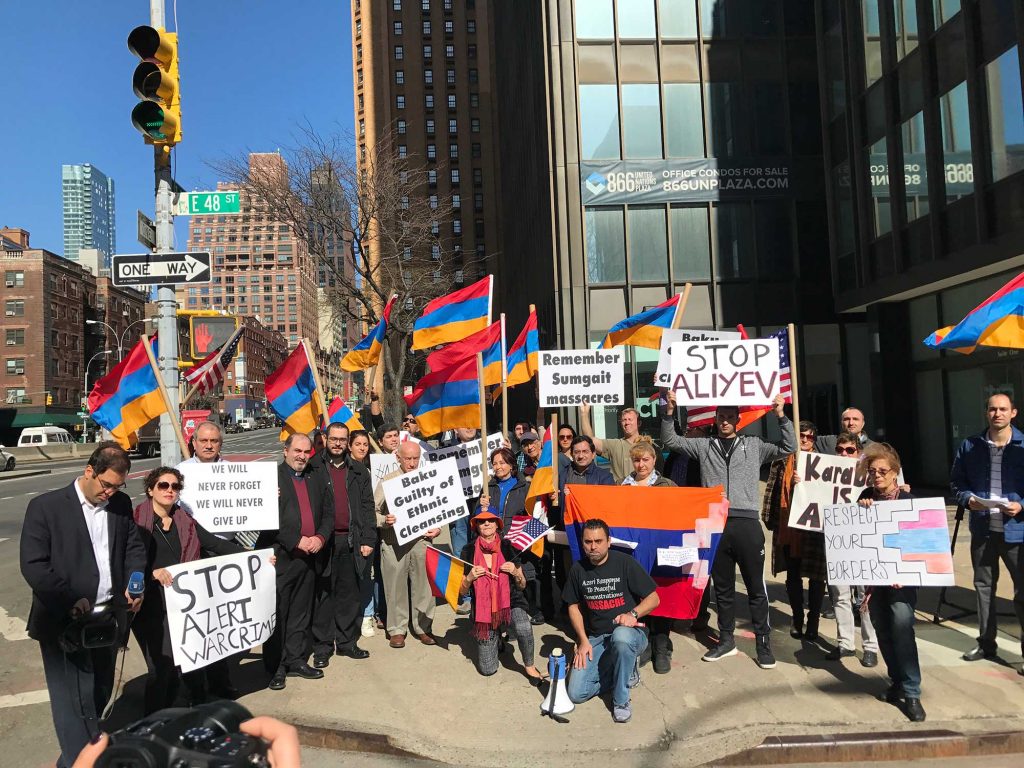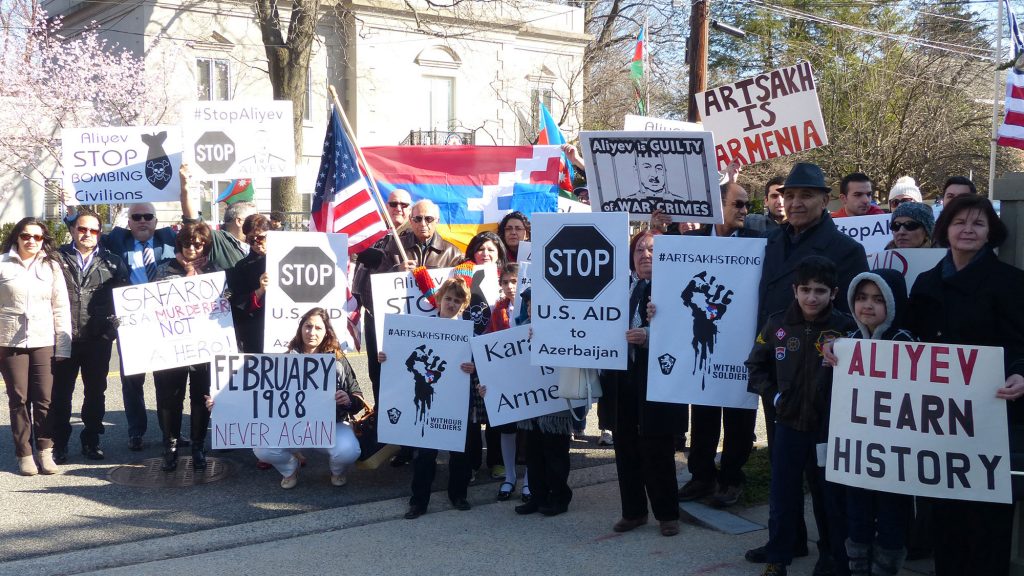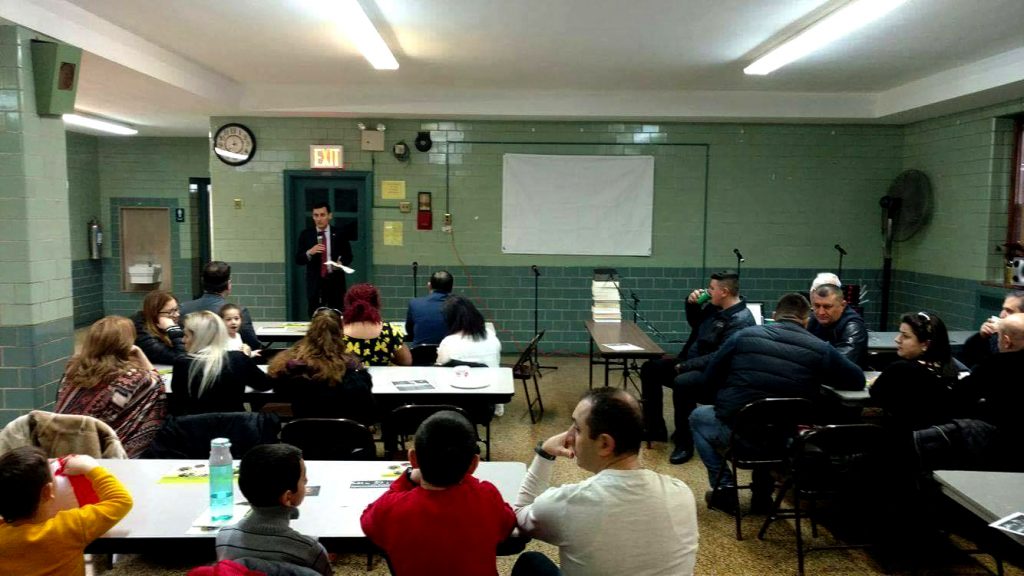Sumgait-Kirovabad-Baku Massacres Commemorated as Aliyev Launches Latest Attacks on Artsakh
NEW YORK/WASHINGTON—Armenian Americans protested escalating Azerbaijani aggression against the Republic of Artsakh (Nagorno-Karabagh) and Armenia in New York City and Washington, D.C. in recent days, in the wake of Azerbaijani President Ilham Aliyev’s largest attacks since his April 2016, four-day offensive that claimed several hundred lives, reported the Armenian National Committee of America Eastern Region (ANCA-ER).

Scenes from the ANC NY protest against Azerbaijani aggression, held on Feb. 24 in front of the Azerbaijan Mission to the UN. (Photo: AYF Eastern Region)
“President Aliyev’s latest attacks this weekend represent a continuation of the pogroms in Sumgait, Kirovabad, and Baku from 1988-1990 and 25 years of escalating ceasefire violations that culminated in the April 2016 atrocities—the worst violence seen in decades,” said ANCA-ER Board Member Audrey Mardoian. “We continue to witness the cost—in innocent lives—of the refusal by the U.S. and the international community to clearly and unequivocally condemn President Aliyev’s aggression and put in place clear measures to stop his violence.”
The demonstrations, organized by the ANC of New York and ANC of Greater Washington, in cooperation with the local Armenian Revolutionary Federation (ARF) and Armenian Youth Federation (AYF) chapters, were held on Feb. 24 and 26 respectively, and coincided with the 29th anniversary of the Azerbaijani pogroms against the Armenian population of Sumgait. Those massacres set the stage for similar attacks in Baku in 1990 and a cycle of violence that continues to this day.
In Washington, Vice-President Mike Pence’s motorcade passed within feet of protesters. At the end of demonstration, Soorp Khatch Armenian Apostolic Church pastor, Fr. Sarkis Aktavoukian, led D.C.-area protesters in a prayer in memory of those who have perished as a result of Azerbaijani aggression.
Also on Feb. 26, the ANC of NY organized a special commemoration of the Sumgait-Baku massacres, hosted by the St. Gregory Mission Parish of the Diocese of the Armenian Apostolic Church – Eastern U.S. and held at the Brooklyn Armenian School, with remarks provided by the ANCA Eastern Region’s Artur Martirosyan.

Scenes from the ANC Greater Washington February 26th protest in front of the Azerbaijani Embassy in Washington (Photo: ANCA-ER)
A small group of Azerbaijani counter-protesters converged in both cities, many brandishing the sign of the Grey Wolves, a Turkish terrorist organization.
According to reports by the Republic of Artsakh Defense Army, on Feb. 275, Azerbaijani forces carried out two attacks at the Artsakh-Azerbaijan line of contact in the direction of Martakert and Akna. Artsakh forces successfully repelled the strike, with no casualties reported. Azerbaijani authorities have confirmed several deaths as a result of their military action. Just a day earlier, on Feb. 24, Azerbaijani forces shelled the Artsakh village of Talish, which had been a primary target during the April 2-6, 2016 Azerbaijani incursion, the worst violence since the 1994 ceasefire.
Over the past two years, U.S. Congressional leaders, including House Foreign Affairs Committee Chairman Ed Royce (R-Calif.), Ranking Democrat Eliot Engel (D-N.Y.), Senior Member Brad Sherman and over 90 colleagues have called for the implementation of the Royce-Engel proposals – a concrete plan to reduce aggression in the region, calling for the 1) removal of snipers 2) increase of Organization of Security and Cooperation in Europe (OSCE) monitors at the line of contact and 3) the deployment of a gunfire locator system to clearly identify aggressors. Armenia and Artsakh have approved the plan. Azerbaijan, to date, continues to obstruct their implementation.
The latest violence raises additional concerns about reports of Azerbaijan’s impending purchase of the Israeli made “Iron Dome” missile system, which includes sensitive U.S. technology. The ANCA has called on the US State Department to exercise its right to oppose the sale, noting that it will only further embolden President Aliyev to increase his aggression.

ANCA-ER Communications Director Artur Martirosyan discusses addresses St. Gregory Mission Parish members at the Feb. 26 commemoration marking the Sumgait-Baku pogroms. (Photo: ANCA-ER)
“We are here to protest Azerbaijan’s most recent attacks and its pattern of violence going back more than a quarter century,” said AYF Central Hai Tahd Council Chair Lara Ozdemirci. “As Americans, we can and must contribute to peace by challenging Azerbaijan’s aggression, cutting off military aid and arms sales to Baku, deploying gunfire locators along the line of contact, and imposing sanctions on Aliyev and his inner circle.”
From 1988 to 1990, the Armenian population in Soviet Azerbaijan was the target of racially motivated pogroms against Armenians in the cities of Sumgait (Feb. 27-29, 1988), Kirovabad (Nov. 21-27, 1988) and Baku (Jan. 13-19, 1990).
At the time, Members of Congress condemned these premeditated and officially-sponsored attacks against Armenian civilians and passed amendments and resolutions demanding respect for the democratic aspirations of the people of Nagorno-Karabagh.
Source: Armenian Weekly
Link: Protests Agaisnt Azerbaijani Aggression Take Place in New York and Washington
